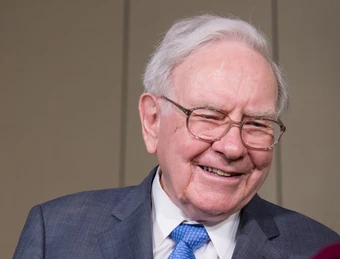Warren Buffett is the first to admit that he doesn’t know much about artificial intelligence. This is consistent with his long-standing philosophy of avoiding his misunderstanding of technique. His massive investment in Apple, which is his largest stock holding, for example, has declined more because of its consumer success than its technological contribution, he said at Berkshire Hathaway’s annual meeting over the weekend. But at a closely watched event in Omaha this year, the billionaire investor and CEO and chairman of Berkshire couldn’t keep AI from shareholders’ minds.
Buffett asked several questions about artificial intelligence. Buffett called artificial intelligence profound and said the technology is like a “genie” that can have devastating effects when let out of the bottle. The worst fears he sees – the massive deception capabilities of AI, which threaten scientific breakthroughs in the same way as nuclear weapons, with unintended consequences and a threat to humanity. And there is at least one question, Buffett said, that no one can answer when it comes to the impact of artificial intelligence on the world, which can change the life of every person every day. It’s a question that has plagued mainstream economists for a century, he said.
“It can create an enormous amount of free time,” Buffett said. “Now there is another question that the world deals with in its free time office for decades.
Buffett gave the example of John Maynard Keynes, one of the most important economic thinkers of our time, who correctly predicted that output per capita would grow exponentially, but failed to predict what people would do with the increased productivity. Keynes is generally regarded as the father of macroeconomics, known primarily for advocating government intervention through social and employment programs to stabilize the economy during recessions, including the Great Depression, and for books such as General Employment, Interest Theory, and Money, which Buffett recommended. add to your reading list.
Productivity has increased in recent quarters. According to BLS data, the recession extended after the huge productivity jump during Covid, and only in the last four quarters has the data reversed, by about 3% per year. This resurgence has prompted questions from business leaders about the potential drivers of AI’s return to the office. But most say it’s too soon for the technology to make the connection that makes the difference between profit-tracking AI, which has been around for years, and generative AI, which everyone is talking about today. it takes some time to appear in the data.
Economists also caution against reading too much into a near-term increase in productivity, as quarterly government data are often significantly revised and it can take years before a significant change in the productivity trend is visible.
AI will eventually be a major driver of productivity, even if it doesn’t exist yet. Gary Cohn, vice president of IBM and former head of the National Economic Council, said on CNBC last week that the adoption of artificial intelligence is fast and productivity growth is also happening, albeit slowly. “Every company is looking at AI and deciding where it’s going to help them,” he said in a recent interview on CNBC’s “Money Movers.”.
“It’s an evolution; we’re evolving into this productivity game, and it’s slowly feeding into the economy,” Cohn said, but he added, “I don’t think we’ve seen real productivity gains from AI.”.
Most companies are still setting AI budgets and an overall strategy for how it can help both customers and employees, and are trying to get into implementation mode.
MongoDB CEO Dev Ittycheria, whose company last week released a set of tools to help companies make AI smarter, recently told CNBC that executives have reached a point where they wonder when AI’s value and revenue will accrue to them. The market is going through a phase where value is only captured at the bottom level, such as Nvidia and ChatGPT/OpenAI, and now it is critical that companies prepare for applications built on this infrastructure.
“There’s a clear trend where we’re moving to ‘agent’ workflows, agents doing things independently on behalf of the end user. It’s a small way out, but people have to build programs and enrich the customer experience and get more cost. business. and find new ways to stimulate growth.”.
Productivity booms and technology
Productivity booms are rare and tend to be once in a generation—the most recent occurred in the mid-to-late 1990s leading to the dot-com crash—a period of significant economic growth not primarily driven by job creation.
Technological advances reducing the number of available jobs is an ongoing problem, and since the launch of ChatGPT in late 2022, countless studies have been published about job losses, or the jargon often used to describe uncertainty about the exact impact on jobs. “AI discovery”.
Companies like to say that AI won’t replace jobs, but will allow human workers to focus on more valuable skills and tasks and give machines jobs that humans don’t want to do anyway. But about 37% of CEOs surveyed by Resume Builder said technology will replace workers in 2023, and 44% said advances in artificial intelligence will lead to more layoffs this year. Historically, however, technological advances — such as increased industrialization — have not proven to be the career killers that experts warn against.
Due to the lack of job opportunities due to the rise of artificial intelligence, some experts as well as billionaires and politicians have expressed the need for a universal basic income, or UBI, to supplement lower or absent wages and keep the economy afloat. . Tech icons Elon Musk, Mark Zuckerberg and Sam Altman discuss the idea.
However, there are reasons to doubt the exact relationship between technology and jobs.
Nobel Prize-winning economist Robert Solow, the godfather of productivity research, said in the late 1980s: “The computer age is visible everywhere except in productivity statistics.”.
This was known as Solow’s productivity paradox and was challenged by the boom of the late 90s. But later research shows that there was a tenuous relationship between the dot-com era and productivity growth. McKinsey, a co-author of the paper, told the Harvard Business Review that Solow’s view of the 90s technology boom was “too simplistic,” as was the later view that the Internet caused a productivity boom.
With these concerns and unanswered questions in mind, Buffett said people-intensive companies like Berkshire Hathaway must weigh the balance between how technology can help them become more efficient without putting people at risk.
“I don’t know how to make sure that happens any more than if you used two nuclear bombs in World War II, you knew you didn’t create something that could destroy the world later.” Buffett said.




